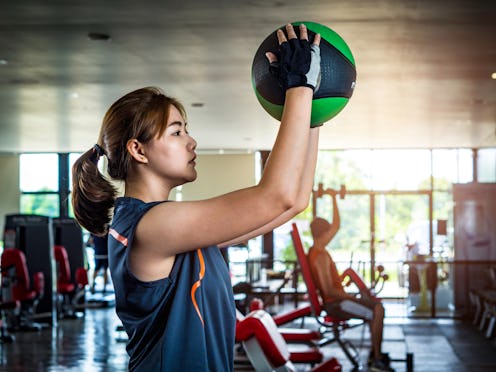Life
If You’re A Vegan Athlete, Here Are The 5 Vitamins You Need Most

It's a myth that vegan people can't get all the nutrients they need to function as both a person and a high level athlete. As a vegan personal trainer myself, it's been my experience that vegan athletes I've trained pay way more attention to their nutrition than many non-vegan athletes. This attentiveness actually gives vegan athletes an edge in many respects, because they know the importance of fueling their bodies for performance and need to do so in an intentional way. But if you're new to getting your nutrition as a vegan athlete, or even if you're a seasoned vegan athlete who could use a refresher, there are always important things to learn about what your body needs.
"Being an athlete, it is important that you do not have any deficiency in your body that keeps you from performing well in your sport," certified holistic nutrition consultant and founder of Gut of Integrity Stephanie Papadakis tells Bustle. In addition to knowing what nutrients your body needs to fuel your best athletic performance, Papadakis also says that combination is key. Combining beans and legumes with grains, combining grains with nuts and seeds, and combining nuts and seeds with beans and legumes are all ways to get your nutrition in.
So if you want to improve your performance as a vegan athlete, the five nutrients below should help you do just that.
1Vitamin B12
For peak brain and nerve function, making sure you get enough vitamin B12 is the way to go. Not only is this nutrient involved in helping to make DNA, but it helps keep your blood and nerve cells healthy, according to the National Institutes of Health.
For athletes, this vitamin is especially important, Papadakis tells Bustle. "A deficiency can affect strength and power performance if these fibers are altered," she says. "If transmission of nervous signals are interrupted, reduced muscular function can occur." And as an athlete, reducing muscular function is the last thing you want. Supplemental forms such as methylcobalamin and nutritional yeast that includes B12 can be essential for vegan athletes.
2Vitamin D3
Because vitamin D is produced by interactions between your skin and the sun, many people — vegans and non-vegans alike — don't realize that you also need Vitamin D that comes from your diet. In addition to its role in preventing osteoporosis by reinforcing your bone structure, Papadakis tells Bustle that "a strong supply of vitamin D strengthens your immune system, prevents muscle weakness, and reduces your risk of injury by lowering inflammation."
As for what foods you should get them from, Papadakis suggests mushrooms and fortified orange juice, non-dairy milk, and cereals. "And don’t be scared of supplements," Papadakis adds, because "when taken properly, under the guidance of a nutritionist, they will drastically improve your performance in a way you never thought possible."
3Iron
More than just for Tony Stark, iron is absolutely essential at making sure that your cells can transport oxygen to all your tissues. Because cells expend energy to do this, a deficiency in iron can create extra work for your body. Along with extra work comes extra fatigue. And fatigue isn't fun for anyone, especially when you're trying to perform well in your sport. But when it comes to consuming (as well as pumping) iron, Papadakis has got you covered: "Best plant sources include legumes, grains, nuts and seeds, tomatoes and Swiss chard."
4Zinc
Developing or maintaining a robust immune system is important for anyone, and athletes often especially loathe getting sick. Because when you're sick, your training performance often plummets, and then you have to take some dreaded time off from your sport. To help prevent this, make sure you've got zinc in your diet, Papadakis says.
"Adequate zinc is necessary for the body to repair tissue and eliminate oxidative stress from heavy training," she tells Bustle. So get ready to chomp down on beans, lentils, nuts, seeds, whole grains, and soy to make sure your immune system is in as great shape as your muscles. An added bonus: beans and lentils are also good sources of iron, so you'll be feeding two birds with one scone!
5Omega-3 Fatty Acids
If one of the reasons you love working out is because of that mood boost it can give you, then you'll definitely want to make sure you're getting all your omega-3s. These essential fats help with mood stabilization and optimal brain function, And because omega-3s also help combat inflammation, Papadakis says getting an adequate supply can "help shorten recovery time from intense training." So if you're looking to increase the effectiveness of your recovery between workouts, Papadakis tells Bustle that you should be looking to integrate walnuts, flaxseed, avocado, and algae into your diet.
6
But all of this advice isn't only important for vegan athletes. All athletes need to pay especially close attention to their nutrition to maximize their performance. To keep reaching your goals, Papadakis says, make sure to "eat a colorful variety of plants every day." And who could complain about colorful plants? Not this vegan athlete, that's for sure.
Studies Referenced:
Zhang, M. (2013) Methylcobalamin: a potential vitamin of pain killer. Neural Plasticity, https://www.ncbi.nlm.nih.gov/pmc/articles/PMC3888748/.
Donaldson, MS. (2000) Metabolic vitamin B12 status on a mostly raw vegan diet with follow-up using tablets, nutritional yeast, or probiotic supplements. Annals of Nutrition and Metabolism, https://www.ncbi.nlm.nih.gov/pubmed/11146329/.
Aranow, C. (2012) Vitamin D and the immune system. Journal of Investigative Medicine, https://www.ncbi.nlm.nih.gov/pmc/articles/PMC3166406/#targetText=Vitamin%20D%20can%20modulate%20the,an%20increased%20susceptibility%20to%20infection.&targetText=The%20immune%20system%20defends%20the,while%20maintaining%20tolerance%20to%20self..
Yin, K. (2014) Vitamin D and inflammatory diseases. Journal of Inflammation Research, https://www.ncbi.nlm.nih.gov/pmc/articles/PMC4070857/#targetText=Beyond%20its%20critical%20function%20in,the%20pathogenesis%20of%20inflammatory%20diseases..
Rasheed, K. (2013) Severe Vitamin D deficiency induced myopathy associated with rhabydomyolysis. North American Journal of Medical Sciences, https://www.ncbi.nlm.nih.gov/pmc/articles/PMC3690793/.
Pittman, RN. (2011) Oxygen transport. Regulation of Tissue Oxygenation, https://www.ncbi.nlm.nih.gov/books/NBK54103/.
Experts:
Stephanie Papadakis, N.C., certified holistic nutrition consultant
This article was originally published on